A CNC Programmer is a professional who creates instructions for computer numerical control (CNC) machines typically used in manufacturing. These instructions, known as CNC programs, are written in code and tell the CNC machine how to move, manipulate and shape materials into desired shapes.
CNC programmers understand mathematics, engineering, and manufacturing principles to create CNC programs accurately. They also have excellent problem-solving abilities, as they must anticipate any issues during manufacturing and adjust the CNC program accordingly. So it’s no surprise that these professionals are highly sought after in the manufacturing industry.
This blog will discuss what CNC programmers are, their roles and responsibilities, qualifications, career opportunities, and more.
A CNC programmer writes the code used to control automated equipment like computer numerical control (CNC) machines. Then, they create instructions for the machine to ensure it performs a certain task correctly and safely. CNC Programmers are knowledgeable about the operation of all types of CNC machining tools and have an intimate understanding of the production process. They design the programs that enable these machines to cut, drill and shape materials with extreme accuracy.
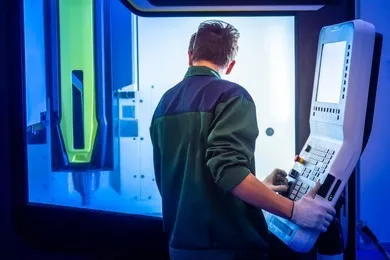
CNC programming is the process of creating instructions for computer numerical control (CNC) machines to automate the manufacturing of products. CNC machines are operated by programmed instructions to control various tools like drills, lathes, and mills. These instructions help to manipulate and shape materials into the desired forms.
CNC programming involves writing codes that specify how the machine should move, which tools to use, and at what speeds and feeds. It helps improve manufacturing efficiency, reduce labor costs, and produce high-quality products.
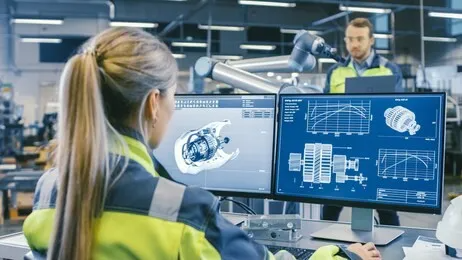
CNC programming is an essential part of the manufacturing industry, as it allows for complex processes to be automated. As a result, it can reduce labor costs and improve accuracy, leading to greater efficiency and higher-quality products. CNC programming also increases flexibility in production processes, allowing manufacturers to switch tools or materials quickly.
CNC programming also plays a crucial role in the safety of workers by eliminating the need for manual labor and reducing the risk of human error. It also helps catch potential errors and defects early, reducing scrap and increasing yield.
The role of a CNC Programmer is to create and maintain programs for CNC machines. In addition, they are responsible for accurately coding the instructions that tell the CNC machine how to move, manipulate and shape materials. Let’s discuss the responsibilities of CNC programmers in detail.
CNC Programmers must thoroughly understand the various types of CNC machines, including milling machines and lathes. In addition, they must be familiar with the tools used to create CNC programs, including CAD/CAM software.
CNC programmers are responsible for creating accurate programs from scratch or modifying existing ones. This includes writing the code in a language the CNC machine can understand. To create CNC programs, CNC programmers should understand machine specs and translate them into code.
CNC programmers must be able to understand the capabilities of a CNC machine and its associated tools. It includes understanding tool sizes, speeds, feeds, and cutting depths.
CNC Programmers must be able to translate design specifications into instructions for a CNC machine. It includes selecting the right tooling, calculating speeds and feeds, and understanding the importance of accuracy in programming.
CNC Programmers must be able to select and optimize the right tools for a particular job. This includes understanding which type of tool is best and optimizing the speed and feeds for a given tool.
CNC programmers must be familiar with the tools used on CNC machines and select the right tool for a particular job. It includes selecting tools with the right size and shape and those that can handle the material.
CNC programmers must be able to optimize tool paths for maximum efficiency and precision. This includes understanding the importance of minimizing air-cutting time, how different tools interact with materials, and calculating the right feed rate for a given tool.
CNC programs must be tested and debugged to run efficiently before being used on production machines. Therefore, CNC Programmers must be able to identify errors and debug programs efficiently.
CNC programmers must be able to simulate CNC programs to identify errors before running a program on a production machine. Therefore, they should understand the importance of simulation and be able to debug programs quickly and efficiently.
CNC programmers must be able to debug and fine-tune CNC programs to ensure they run optimally on a production machine. This includes understanding the impact of tool selection and optimization on overall performance.
CNC Programmers must possess many skills, including knowledge of machine tools and CAD/CAM software, and more. Below are the details about the skills and qualifications required of CNC Programmers to be successful:
CNC programmers must be proficient in CAD/CAM software to create CNC programs. It includes knowledge of software features, such as three modeling’s and tool path optimization. In addition, they must be able to use the software to create programs optimized for specific machines.
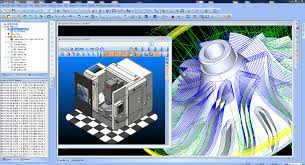
CNC Programmers must possess a thorough understanding of the operations and tooling of CNC machines. This includes knowledge of machine tools, cutting speeds, feeds, depths, and other parameters that may affect the accuracy of a program.
CNC Programmers must be familiar with various programming languages used in CNC programming. The most common programming languages used are G-Code and M-Code. To program a CNC machine, both G-codes and M-codes are required for different processes. G-codes are used for CNC mills, while M-codes are used for routers.
CNC Programmers must possess analytical and problem-solving skills to identify issues with a program, debug it, and fine-tune it for optimal performance. They should also be able to identify problems with a CNC machine and its programming before it is used for production.
CNC Programmers must pay close attention to detail and precision when creating programs. It includes understanding the parameters of a CNC machine, selecting the right, and ensuring that programs run as intended. They must also pay attention to safety protocols when working with CNC machines.
By mastering these skills, CNC Programmers can use their knowledge and expertise to ensure that CNC programs are efficient and accurate. This, in turn, helps production processes become more streamlined and cost-efficient.
The working environment of a CNC programmer can vary depending on the industry they work in. For example, they may work in a manufacturing facility or a machine shop. In addition, they may work in teams and collaborate with other professionals such as CNC operators or engineers.
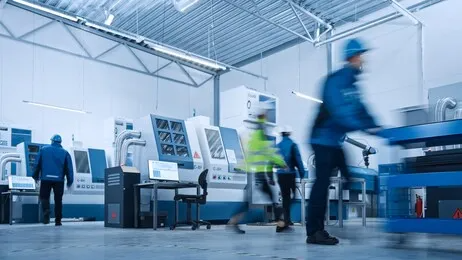
CNC programmers must also collaborate with designers, engineers, and machinists to create programs that meet the needs of a production process. They develop and execute plans for CNC programs based on the designs provided by engineers and designers. In addition, it is important to communicate regularly with machinists to ensure that programs run as intended on the production floor.
Effective communication with other professionals in the manufacturing process is a crucial skill for CNC Programmers. They must interpret technical drawings accurately and convey their requirements clearly to others involved in production. Moreover, they should be able to justify their programming decisions and respond to any queries related to their programs.
CNC programmers must also be able to coordinate with machine operators and technicians. They should be able to set up machines according to a program’s requirements and troubleshoot any issues on the production floor.
In addition, CNC programmers need to communicate effectively with machine operators and technicians to ensure that the program runs as intended. They should also be able to provide feedback and adjust programs as needed to increase production efficiency.
CNC Programmers must also be aware of safety and quality standards in the industry. They should be able to identify potential risks related to a program or a CNC machine and take steps to ensure that these are addressed before production starts. Furthermore, they should be able to review programs for accuracy and adherence to set standards before it is used on the production floor.
By adhering to safety and quality standards, CNC programmers can ensure that a production process runs smoothly and efficiently. This helps minimize any delays or issues related to a program and reduces costs associated with rework. Moreover, it also prevents any risks on the production floor, such as accidents, which can be costly in terms of time and money.
By mastering the abovementioned skills, CNC programmers can become an invaluable asset to any organization. In addition, they can identify problems with a CNC machine and its programming before it is used for production.
CNC Programmers are in high demand due to their technical skills and ability to solve problems quickly. They can find career opportunities in various manufacturing industries, such as automotive, aerospace, medical devices, and robotics.
With experience, CNC programmers can advance in their careers by taking on more responsibility or moving up the management ladder. Below are the different career advancement opportunities for CNC programmers.
CNC Programmers can find a variety of job opportunities in various manufacturing industries. For example, they may be hired as a CNC programmer or technical support specialist or find opportunities in other related fields, such as quality assurance or product engineering.
In addition, CNC Programmers may also find opportunities in research and development. This can involve developing new products or improving existing ones using CNC programming.
CNC Programmers who wish to advance their careers may also consider an advanced degree in a manufacturing-related field. It can include mechanical engineering, industrial engineering, or robotics. With the right qualifications and experience, CNC programmers can move into higher positions, such as operations managers and production supervisors.
With experience, CNC Programmers may also advance into more senior programming or supervisory positions. This can involve overseeing the entire manufacturing process and ensuring it runs smoothly and efficiently. In addition, CNC programmers may also be tasked with training new personnel or developing strategies to improve production efficiency.
CNC Programmers should also take advantage of continuing education opportunities to stay up-to-date on the latest technologies and best practices. This can involve taking classes, attending seminars, or completing online CAD/CAM programming or automation courses. By continuously expanding their knowledge, CNC programmers can ensure they are well-equipped to take on any challenge that comes their way.
By mastering the skills and knowledge necessary to be successful as a CNC programmer, individuals can become an asset to their organization and advance in their careers. With the right qualifications and experience, CNC programmers can open many doors leading to career advancement opportunities.
CNC Programmers typically earn a salary commensurate with their experience, qualifications, and location. According to Zip Recruiter, the top earners of CNC programmers earn an average annual wage of $80,500. With experience and skill development, they can expect to increase their earning potential over time.
In addition to salaries, CNC Programmers often receive additional benefits, such as health insurance and retirement plans. In addition, depending on the employer, they may also be eligible for bonuses and incentives.
Having the right programming software for proper CNC machine operation is important. Here is a list of some of the best beginner CNC machine software for beginners:
· Fusion 360
· Linux CNC
· Grbl
· NanoCAD
· Inkscape
· SolidWorks
· FreeCAD
· PowerMILL
Several CNC machines are used in the manufacturing industry, each designed to perform specific tasks. Here are some of the most common types of CNC machines:
A CNC milling machine is a type of CNC machine that uses rotary cutters to remove material from the work piece. It usually has two or more axes that move in different directions and can be programmed to perform complex operations.

A CNC lathe machine is used for cutting and shaping metal or other materials. It is a computer-controlled machine that can rotate quickly and accurately to create precise shapes and patterns in metals, plastics, and wood.
CNC router machines are used for cutting and routing sheet material such as wood, plastic, composites, aluminum, and steel. They are usually programmable and have a variety of tool configurations to suit different applications.
A CNC plasma cutting machine uses electricity to cut materials with high accuracy. It is commonly used for cutting metal, plastic, and other materials.
A grinding machine is used to finish surfaces of metal and other materials. It usually has two or more heads that can be programmed to move automatically in different directions, allowing precise control over the finished product.
CNC laser cutting machines use a powerful laser beam to cut intricate shapes from various materials. They are used for high-precision cutting of metal, plastic, composites, aluminum, and other materials.
A drilling CNC machine is used to drill holes in different materials precisely. It can be programmed to perform multiple operations, and it also can drill multiple holes at once.
If you are looking forward to buying CNC machines, look no further than CNC Yangsen. It offers the latest CNC machines at competitive prices and excellent customer service. Moreover, with its wide range of machines, you can accommodate all your CNC programming needs.
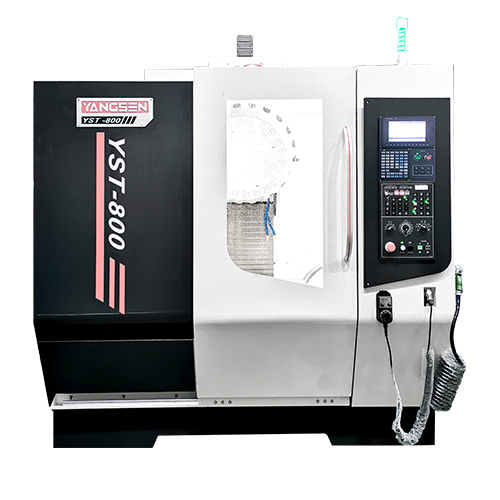
CNC programming is crucial in the manufacturing industry as it enables the automation of product manufacturing through computer numerical control machines. This results in improved efficiency and better quality products. To become a CNC programmer, one must have diverse skills and qualifications, including familiarity with CAD/CAM software, CNC machinery operations, tooling, and programming languages.
As technology develops, there is a growing need for individuals skilled in CNC programming. This translates into various career possibilities, such as a CNC programmer, CNC machinist, CNC operator, and manufacturing engineer. With the right qualifications and experience, CNC programmers can open doors to career advancement. In addition, the salary is also attractive in this field, as CNC programmers are highly valued and compensated well.
With the right qualifications and experience, CNC programming can be rewarding and lucrative. With the ability to produce high-quality parts faster, CNC programming is essential for any manufacturing industry. In addition, individuals with the right qualifications and experience can find plenty of career advancement opportunities in this field. So if you’re looking for a new career path or to take your current career to the next level, CNC programming might be the right choice.